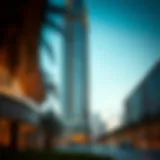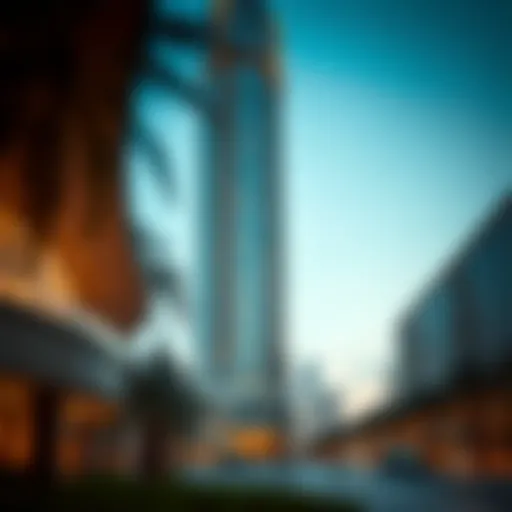Dubai: A Global City of Intrigue and Opportunity
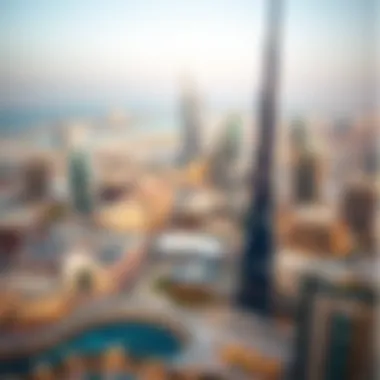

Intro
Dubai stands as a beacon in the desert, a melting pot of tradition and modernity that invites exploration. Its rapid transformation from a modest fishing village into a global hub of commerce, leisure, and culture is nothing short of fascinating. With skyscrapers piercing the clouds and sprawling malls nestled amidst historic souks, the city offers an eclectic mix of experiences.
As global cities go, Dubai has carved out a unique identity that intertwines its rich heritage with a futuristic vision. Here, you will find everything from the opulent Burj Khalifa, which dramatically defines its skyline, to the bustling markets in Deira that echo tales of trade and history. In this article, we are about to take a closer look at the neighborhoods that compose this vibrant metropolis, along with the amenities that make living and visiting Dubai an absolute delight.
Neighborhood Overview
Historical Significance
Every corner of Dubai holds a story; its history is akin to the intricate patterns found on traditional carpets. The city’s roots stretch back to the 18th century when it was primarily a pearl diving center. Over the decades, histories interwoven with trade have fueled Dubai's meteoric rise. Today, places like the Al Fahidi Historical Neighborhood stand as storied reminders of the past, showcasing the Emirati way of life in a district replete with winding alleys and wind towers.
Cultural Highlights
From the mundane to the breathtaking, Dubai's culture is a tapestry woven with threads from various corners of the world. At the heart of this cultural explosion is the Dubai Opera, a venue that regularly plays host to world-class performances, making art accessible to many.
Furthermore, the vibrant atmosphere in neighborhoods such as Al Quoz is infectious, as art galleries and workshops thrive side-by-side, encouraging creativity at every corner. Whether it’s the smell of spices wafting through the air at the Spice Souk or the sounds of laughter at the Dubai Shopping Festival, the cultural highlights are as diverse as the populace itself.
Dubai's neighborhoods are rich with history, offering insights into a culture that seamlessly integrates modernity and tradition.
Local Amenities
Dining and Entertainment Options
Dining in Dubai is a treat for the senses, with options ranging from Michelin-starred establishments to modest local eateries. Head to the Dubai Marina for a plethora of choices, where international flavors align with local culinary gems that reflect the city’s diversity. Nightlife, too, resonates through the city, whether it’s the vibrant beach clubs along Jumeirah or the quieter lounges found in Downtown Dubai.
Community Services and Facilities
The community spirit in Dubai is striking, with amenities that cater to both locals and expats. For families, schools such as the Dubai American Academy and The British International School provide high-quality education. Health services, too, are top-notch, with hospitals like the American Hospital Dubai ensuring the well-being of residents. Expats can find comfort in community centers that celebrate various cultures and offer programs for all ages.
Explore more about Dubai at Wikipedia and see how this city continues to evolve and grow.
The journey through even a single neighborhood reveals how Dubai has fashioned a unique blend of innovation and respect for tradition. Each visit is an opportunity to discover something new, an adventure waiting just around the corner.
Preface to Dubai as an International City
Dubai stands as a beacon of what a city can achieve within decades. As a melting pot of cultures, languages, and ideas, it has garnered the attention and admiration of people from all walks of life. The importance of this section lies in understanding how Dubai transformed into an international hub that attracts not only tourists but also businesses and expatriates eager to tap into its opportunities.
Thinking about Dubai prompts images of luxury shopping, towering skyscrapers, and expansive desert landscapes. But there’s more to this city than meets the eye. It's crucial to examine the backbone of its evolution, the interplay of history, strategic geographical positioning, and socio-economic factors that have pushed its ascent on the global stage.
Benefits of Recognizing Dubai’s International Identity
- Economic Stability: Dubai's robust economy is a major draw for investors and entrepreneurs, prompting growth in various sectors like trade, tourism, and finance.
- Cultural Exchange: The diverse population fosters a rich cultural tapestry that contributes to a unique lifestyle and vibrant community.
- Strategic Positioning: Dubai’s location makes it a crossroads of east and west, enabling access to markets that are often hard to reach.
In summary, this article will dissect Dubai's multifaceted identity, exploring how its past shaped the present and will continue to influence its future as a thriving metropolis.
Historical Development of Dubai
Dubai's story begins from humble beginnings as a small fishing village and pearl diving center. In the 18th century, it accepted traders from around the region, establishing its status as a trading post. The discovery of oil in the 20th century marked a turning point in its history, turning the city into what we know today. During the 1970s, the formation of the United Arab Emirates catalyzed massive infrastructural changes, emphasizing modernization and international trade. Today, one can see the effects of this evolution in the city’s architecture and urban planning.
Dubai’s Geographical Significance
Nestled between the Persian Gulf and the desert, Dubai's geographical position offers an advantageous climate for international trade and tourism. With easy access to key markets in Asia, Europe, and Africa, it acts as a logistical hub, housing the world’s busiest airport for international travel, Dubai International Airport. This strategic location is not just a boon for the economy but also enhances its appeal as a destination for global events, exhibitions, and conferences.
"Dubai’s geographic advantage serves as a bridge between nations, facilitating a constant flow of commerce and cultural exchange."
Ultimately, Dubai exemplifies the qualities of a true international city—its history and geography emphasize its integral role in the global framework, making it an area ripe for opportunities yet firmly rooted in its past.
Cultural Diversity in Dubai
Dubai’s rich tapestry of cultural diversity is one of its most defining features. It acts as a magnet for people from every corner of the globe, creating an interplay of traditions, languages, and customs. In this dynamic environment, the blending of various cultures not only enriches the social fabric of the city but also underpins its economy and lifestyle. Understanding this cultural mosaic informs many aspects of living, working, and visiting Dubai, making it vital for anyone interested in the emirate's essence.
The Melting Pot of Communities
When wandering through the bustling streets of Dubai, one can feel the heartbeat of a multitude of communities pulsating together. This city is home to expatriates from all over, constituting approximately 89% of its total population. Asian, Western, Middle-Eastern, and African cultures mix together, creating a vibrant atmosphere. The Dubai International Airport, often referred to as the crossroads of the world, facilitates this influx, connecting over 200 destinations.
The neighborhoods reflect this diversity. For instance, in Deira, you can find a traditional spice market bustling with Indian and Arab merchants, while Al Quoz showcases a thriving arts scene influenced by Western culture. Food, music, and festivals like Diwali and Eid are celebrated with equal fervor, bringing communities together and fostering mutual respect.
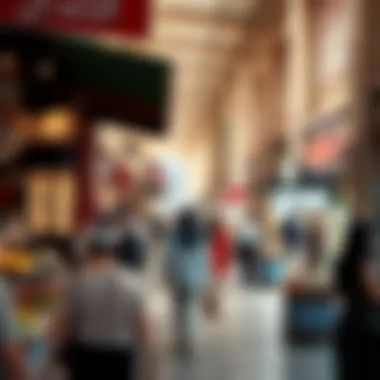

"In Dubai, cultural appreciation is not just a buzzword; it's woven into the city’s identity."
This melting pot effect offers remarkable benefits. Businesses thrive due to varying perspectives, adaptive strategies, and open-mindedness. Additionally, the residents get exposure to different cuisines, festivals, and languages, enriching their lives and broadening their understanding of the world.
Cultural Influences and Heritage
While Dubai is often seen as a beacon of modernity, the roots of its rich heritage and cultural influences are deep. The city has a historical foundation that reflects traditional Bedouin values, and this influence continues to be significant today. Exhibits in the Dubai Museum emphasize this heritage, showcasing the emirate’s transition from a fishing village to a global hub.
The architectural styles found in Dubai Creek and Al Fahidi Historic District exhibit a blend of old and new—where modern skyscrapers tower over ancient wind-tower homes. Such contrasts symbolize the city’s journey; maintaining cultural significance while embracing modern innovations.
Dubai’s cultural scene is alive with art galleries, theaters, and museums dedicated to nurturing local talent and honoring global arts. The annual Art Dubai fair brings together creatives from various backgrounds, promoting cross-cultural dialogues. Moreover, educational initiatives focused on heritage ensure that both residents and visitors appreciate the past that laid the groundwork for the present.
Apart from arts and architecture, the Islamic influence is another cornerstone, shaping everyday life. The call to prayer resonates throughout the city, serving as a reminder of the city’s spiritual roots amid its rapid development. The balance between the traditional and the contemporary is what makes Dubai a fascinating study in cultural diversity, drawing attention from scholars, tourists, and expats alike.
Economic Landscape of Dubai
The economic landscape of Dubai is nothing short of dynamic, characterized by its rapid growth and transformation into one of the world’s most important business centers. With its strategic geographic location, Dubai has become a crossroads for trade, finance, and tourism. This section will dive into the various facets of Dubai’s economic prowess, addressing key elements such as trade ventures, financial services, and the tourism sector that underpins its economic vitality.
Trade and Commerce in Dubai
Dubai's trade and commerce scene paints a vivid picture of a bustling marketplace. The emirate has cultivated its reputation as a global trading hub since its early days as a small fishing village. The establishment of free trade zones has attracted businesses from around the globe, allowing for a business-friendly atmosphere that encourages foreign investment. Given its strategic location, Dubai serves as a convenient entry point for countries in the East and West.
Key Aspects of Trade in Dubai:
- Diverse Trading Sectors: From electronics and textiles to gold and textiles, Dubai offers a myriad of trade opportunities across various industries.
- Logistics and Infrastructure: The remarkable infrastructure, such as the Jebel Ali Port and Dubai International Airport, facilitates smooth trade activities, providing efficient access to worldwide markets.
- Free Trade Zones: Areas like Dubai Airport Freezone and JAFZA incentivize foreign businesses with benefits like tax exemptions and 100% foreign ownership.
The significance of Dubai's trade sector cannot be overstated, as it not only contributes significantly to the emirate's GDP but also plays a vital role in its international relations.
Dubai as a Financial Hub
With the rise of the financial services sector, Dubai asserts itself as a global financial center, hosting numerous banks, investment firms, and insurance companies. The Dubai International Financial Centre (DIFC) stands out as a key player, providing a platform for companies to tap into the burgeoning finance market of the Middle East region.
Features of Dubai's Financial Sector:
- Robust Regulatory Framework: The presence of a regulatory framework that fosters transparency and compliance boosts investor confidence.
- Access to Global Markets: Financial institutions in Dubai benefit from a time zone that aligns with markets in Europe, Asia, and Africa, making it a strategic base for global operations.
- Innovative Financial Services: The rise of fintech in recent years has further diversified the financial services landscape, from mobile banking to blockchain technologies.
Dubai’s financial hub enhances the emirate's reputation on the global stage, enabling it to compete effectively with other major financial centers.
Tourism Industry Insights
Tourism in Dubai is not just a staple of its economy; it is a defining feature of its cultural identity. The city attracts millions of visitors annually, drawn to its lavish lifestyles, architectural wonders, and the luxurious shopping experience that it promises.
Insights into Dubai's Tourism Sector:
- Iconic Attractions: Landmarks like the Burj Khalifa and the Palm Jumeirah are magnets for tourists, fueling the hospitality sector.
- Cultural Experiences: Initiatives like the Dubai Expo and cultural festivals provide visitors with glimpses into local traditions and global creativity.
- Economic Contribution: The tourism sector generates substantial employment and is projected to contribute significantly to the emirate's GDP in coming years.
Architectural Marvels and Urban Planning
Dubai showcases its ambition and vision through its architectural wonders and meticulous urban planning. The city speaks to the interplay of functionality and aesthetics, seamlessly combining these elements to create a landscape that both captivates and serves the community. Active planning has been crucial to addressing the demands of an ever-growing population and diverse economy while maintaining the city’s identity as a leading global center.
One cannot speak of Dubai’s architecture without mentioning its iconic skyscrapers. Structures like the Burj Khalifa not only dominate the skyline but symbolize the city’s innovative spirit. Completed in 2010, Burj Khalifa stands as a testament to what can be achieved when engineering meets artistry. Standing at 828 meters, it holds multiple records, inspiring dreams and aspirations well beyond Dubai’s borders. Additionally, the Burj Al Arab, sculpted like a sail, is another structure that draws attention, showcasing how Dubai mixes luxury with cutting-edge design. These landmarks, along with many others, contribute not only to tourism but also to the city’s real estate value.
Urban planning in Dubai is equally ingenious, focusing on sustainability and accessibility. Smart city initiatives have been launched, incorporating technology to enhance the quality of life. For instance, integrated public transport systems ensure that people can travel efficiently across the sprawling metropolis. The Dubai Metro, a driverless, fully automated network, is a prime example of how the city is investing in infrastructure. It connects major areas, reduces traffic congestion, and promotes a greener environment by encouraging the use of public transport rather than private vehicles.
"Dubai's approach to urban planning ensures that as it grows, it remains livable and enjoyable for its residents, capturing the imaginations of visitors across the globe."
Iconic Landmarks and Structures
Within Dubai, iconic landmarks play a significant role, not just in the architectural sense but also as symbols of the city itself. Beyond the Burj Khalifa and Burj Al Arab, structures like the Palm Jumeirah and Dubai Frame add to the identity of the city. The Palm Jumeirah, an artificial archipelago, reshaped the coastline and offers luxury living spaces coupled with recreational facilities. Meanwhile, the Dubai Frame, a newer addition to the skyline, allows visitors to see the past and future of the city in a single vantage point, symbolizing how tradition can fold into modernity.
Each of these landmarks enhances the narrative of Dubai, creating a tapestry of cultural significance and technological advancements. This construction surge isn’t merely about aesthetics; it serves practical purposes, such as attracting tourists and encouraging business investments.
Sustainable Urban Development Practices
Sustainability is woven into the very fabric of Dubai's urban planning. The government’s commitment to fostering an eco-friendly environment reflects global trends towards sustainability. Initiatives such as the Dubai Clean Energy Strategy aim to provide 75% of Dubai’s energy from clean sources by 2050. Innovations like solar energy farms and green building regulations are steps being taken to achieve this goal.
Moreover, residential areas are designed with sustainability in mind, where energy-efficient buildings feature prominently. The use of smart technologies in homes conserves resources while enhancing comfort.
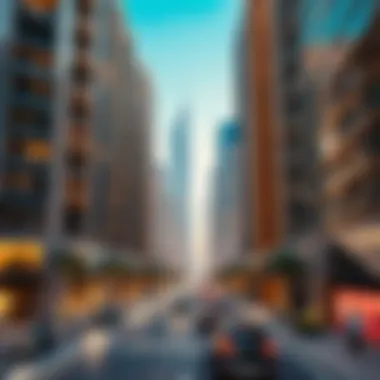

Additionally, urban green spaces have become essential. Parks, waterfronts, and community gardens are being incorporated into the cityscape, promoting biodiversity and offering residents places to unwind. Projects like the Dubai Miracle Garden showcase a commitment to greenery and celebrate the potential of landscaping as part of a modern urban environment.
In summation, Dubai's architectural marvels and urban planning are not arbitrary; they are strategic decisions aimed at fostering a unique social and economic ecosystem. The city's dedication to blending alluring aesthetics with sustainable practices positions it not just as a global hub but as a model for future urban development.
Dubai's Neighborhoods and Districts
Dubai’s neighborhoods are not just mere locations; they embody the city’s spirit, blending tradition with modernity. Each district tells a unique story that reflects the diverse culture, economic opportunities, and social dynamics that draw people from across the globe. Understanding these neighborhoods helps both residents and newcomers navigate the urban landscape of this remarkable metropolis.
Every corner of Dubai reveals characteristics that appeal to different lifestyles—be it the flashy life of skyscrapers or the quaint charm of historic streets. Here are a few central districts that shape the identity of Dubai and attract various communities.
Downtown Dubai: The Urban Core
Downtown Dubai serves as the beating heart of the city, showcasing a breathtaking skyline punctuated by remarkable structures such as the Burj Khalifa, the tallest building in the world. This area stands as a symbol of architectural ambition and urban lifestyle.
Key Highlights:
- Cultural Attractions: The Dubai Mall and the Dubai Opera provide residents and tourists alike with splendid shopping and world-class performances.
- Social Hub: The area hosts numerous events throughout the year, fostering a vibrant community spirit. The Burj Park, with its spectacular views, becomes a gathering spot during festivals, especially the New Year celebrations.
- Transportation: Well-connected by the Dubai Metro and public transportation, getting around is seamless. This accessibility enhances its appeal to expatriates and visitors.
Living in Downtown Dubai is often described like being part of a bustling international tapestry, where every day you can find something fresh to experience, whether it be a new restaurant or an art installation.
Dubai Marina: An Evolving Waterfront
Dubai Marina is a marvel of planning, offering an extravagant lifestyle alongside stunning waterfront views. As one of the most sought-after residential districts, it perfectly marries leisure and luxury.
Key Features:
- Vibrant Nightlife: The Marina is famous for its lively nightlife scene. Bars and restaurants that line the waterfront are perfect spots for socializing, giving a taste of Dubai’s upscale social life.
- Recreational Activities: A stroll along the Marina Walk or enjoying water sports is part of daily life for many residents. The district also features numerous parks and leisure facilities, appealing especially to families.
- Diverse Population: Home to a significant expatriate community, Dubai Marina reflects a blend of cultures, making it a melting pot of experiences and flavors.
Whether you are looking to unwind on a yacht or savor a meal with a view, Dubai Marina provides a continuous spectacle of life and leisure that keeps evolving.
Historical Districts: Preserving Heritage
In contrast to the flashy skyline and contemporary developments, Dubai’s historical districts offer a glimpse into the city’s rich heritage. Areas like Al Fahidi and Deira are repositories of cultural identity and tradition, preserving the essence of a once-simpler time.
Important Aspects:
- Architectural Heritage: Traditional wind-tower architecture, such as those found in Al Fahidi, provides insight into the city’s history and the ingenuity of its past inhabitants. Walking through these streets feels as if you've traveled back in time.
- Cultural Centers: Institutions like the Dubai Museum and the Sheikh Mohammed Centre for Cultural Understanding play crucial roles in educating visitors about the Emirati culture and traditions.
- Local Markets: Visiting the Gold Souk and Spice Souk offers a sensory experience that immerses individuals in local commerce and traditions. These markets are essential for maintaining Dubai’s cultural fabric.
Exploring these historical neighborhoods is vital to understanding how the past informs the present, making it crucial for both tourists and residents to appreciate Dubai’s roots as they navigate its modern landscape.
“The neighborhoods in Dubai are like microcosms inside this vast desert city, each with its own story, character, and soul.”
Quality of Life in Dubai
When discussing why Dubai stands out as a global city, one must look closely at the quality of life it offers. Stretching beyond luxurious shopping malls and skyscrapers, the essence of living in Dubai encompasses a harmonious blend of modern amenities, cultural experiences, and community life. The city provides a unique environment that caters to diverse demographics, making it an attractive place for both expatriates and locals alike.
Dubai's quality of life is a critical component in understanding what makes this city tick. It reflects not only the infrastructure and services but also people's experiences and satisfaction levels. With its impressive economic growth and multicultural society, residents often find themselves enjoying a rich lifestyle full of opportunities.
Educational Institutions and Opportunities
Education in Dubai is a vibrant tapestry woven from local and international threads. The educational landscape is marked by prestigious institutions like the American University in Dubai and the University of Dubai, which offer various programs ranging from business administration to engineering. These establishments provide quality training designed to equip students well for the ever-evolving job market.
Moreover, the presence of renowned institutions such as Heriot-Watt University fosters a conducive environment for higher learning. The diversity of educational options allows families to select schools that best meet their children's needs, including numerous curricula from British to Indian and even the International Baccalaureate.
Benefits of studying in Dubai:
- Access to global scholarship programs.
- A melting pot of cultures that enriches social interactions.
- Numerous extracurricular activities that promote holistic growth.
Expats are often pleasantly surprised by the quality of education available, which not only adheres to high standards but also prepares students for an interconnected global environment.
Healthcare Access and Quality
Dubai's healthcare system is yet another feather in the cap of its quality of life. With a well-structured mix of public and private institutions, residents can access a wide range of healthcare services. The city boasts hospitals like Dubai Healthcare City and American Hospital Dubai, which are often equipped with cutting-edge technology and staffed by skilled professionals from around the world.
The Emirate has made significant investments in healthcare infrastructure, making strides toward providing universal health coverage. Government initiatives ensure that public hospitals offer quality services at no cost to UAE citizens, while expats can choose from various insurance plans to cater to their specific needs.
Key aspects of healthcare in Dubai include:
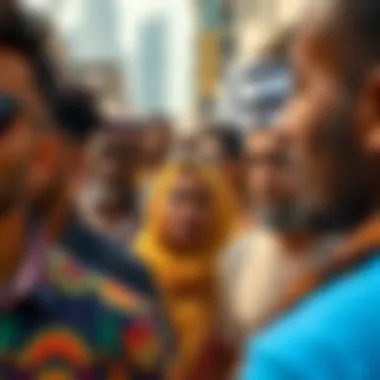

- Specialized medical centers addressing diverse health concerns.
- Emergency services that operate 24/7, ensuring quick response times.
- High levels of patient satisfaction often reported in surveys.
"In Dubai, health is not just a concern but a priority, with numerous options to ensure one’s well-being."
The healthcare system is continually evolving, aiming for higher satisfaction and better access for all residents. The combination of advanced medical facilities and a multicultural team of healthcare professionals contributes significantly to the overall quality of life in this dynamic city.
Social Dynamics and Community Engagement
Understanding the social dynamics and community engagement in Dubai is crucial for grasping the city’s essence. As a thriving international hub, Dubai is a tapestry woven with threads of cultures from all corners of the globe. This section delves into how these multicultural interactions shape social structures and community life, influencing everything from local regulations to daily gatherings. The reciprocal influence between expatriate communities and local governance presents a canvas for exploration, bringing forth benefits that enhance the living experience in this unique urban space.
Expatriate Communities’ Influence
The expatriate population in Dubai is a significant driving force behind the city’s social landscape. With around 90% of the population consisting of non-nationals, the diverse cultural blend fosters a rich environment of collaboration and creativity. Communities like the British, Indian, and Filipino populations, among others, find their niches here, contributing to local businesses and cultural events.
For instance, the annual Dubai Shopping Festival, influenced by various national communities, showcases a vibrant mix of traditions and marketplaces that draw tourists and locals alike. The festive spirit of these expatriate groups fosters an atmosphere that encourages social bonds, networking, and community spirit, transforming Dubai into a microcosm of global cultures.
Moreover, expat-led organizations play an important part in community development. Here are some ways they contribute:
- Cultural exchange programs: These foster understanding and appreciation for various traditions.
- Social clubs and gatherings: They create platforms for networking and support.
- Charitable activities: Expatriate communities often coordinate initiatives to give back to local charities, benefiting the wider society.
"The beauty of Dubai lies not just in its skyscrapers, but in the melting pot of cultures thriving within its communities."
Civic Participation and Local Governance
Civic participation in Dubai reflects the interplay between its diverse populace and the Emirati governance model. Residents, including expatriates, are encouraged to engage in various socio-political processes, albeit within limits set by the local laws. The governmental push for community involvement has resulted in initiatives that promote dialogue and collaboration between residents and local officials.
For example, community councils in different districts enable citizens to voice concerns and suggest improvements regarding local management, from infrastructure to public services. These councils often include representatives from both local emirati citizens and expatriate communities, ensuring diverse perspectives in decision-making processes.
Furthermore, the use of digital platforms has revolutionized civic engagement. The Dubai People’s Council offers a unique online portal where residents can propose ideas or report issues directly to government authorities. This approach not only increases accessibility but also ensures that initiatives cater to the real needs of the diverse population.
For more insights into municipal initiatives, citizens can visit the Dubai government official website at www.dubai.ae.
By weaving together the narratives of various communities and fostering open channels for civic participation, Dubai sets the stage for a united and prosperous future.
Challenges and Future Outlook
Dubai stands at a crossroads, navigating through complex challenges that threaten its rapid growth and future prosperity. Addressing these challenges isn't just beneficial; it's essential for maintaining its status as a premier global city. The city's leadership recognizes that sustainable strategies will not only enhance the quality of life for residents and visitors but can also ensure long-term economic resilience. As we take a closer look at the challenges facing Dubai, two significant themes emerge: economic diversification efforts and navigating environmental concerns.
Economic Diversification Efforts
Economic diversification is a critical strategy for Dubai's long-term sustainability. While the city has thrived under the shadow of its oil wealth, reliance on that single revenue stream can feel like balancing on a tightrope. Constant shifts in global oil prices remind us that diversification is not mere foresight but a necessity. As the world leans towards renewable energy and lessens its dependency on fossil fuels, Dubai has initiated various programs aimed at spreading its economic wings.
The government has rolled out initiatives, such as the Dubai Industrial Strategy 2030, which aims to create a more resilient industrial sector. This strategy will not only help in decreasing dependence on oil but also in fortifying the manufacturing and trade industries.
In addition to manufacturing, tourism has become a cornerstone of diversification efforts. The goal here is to attract a broader range of tourists—from interested families to adventure seekers. Programs in hospitality management and tourist engagement also aim to keep Dubai relevant in an ever-competitive global landscape.
Moreover, technology and innovation play a central role in its economic strategy. The establishment of various free zones tailored for startups and tech companies has already begun to bear fruit. The likes of Silicon Oasis and Dubai Internet City serve as incubation hubs that can spark the next big breakthrough, fostering an environment where innovation doesn't just survive—it thrives.
Navigating Environmental Concerns
Yet, amid this growth, environmental concerns loom large. Urbanization can come with serious environmental trade-offs, and Dubai is no exception. Rapid development has led to concerns around sustainability, waste management, and energy consumption. Addressing these concerns isn't just a matter of preserving natural beauty—it's vital for ensuring the well-being of current and future residents.
One significant initiative is Dubai's commitment to the Dubai Clean Energy Strategy 2050, which aims to make the city a global center for clean energy and green economy. This is no small task, considering the iconic architectural feats that define the skyline. Transitioning from traditional energy sources to alternatives such as solar power remains a critical focus.
Additionally, issues like waste production have to be tackled head-on. The city is pushing for a circular economy model to minimize waste and maximize resource efficiency. This initiative seeks to not just manage waste but also to convert it into new opportunities—the kind that could provide economic returns while bringing environmental benefits.
Closure: The Essence of Dubai as an International City
Bringing together the threads of culture, economic weight, and urban design, the essence of Dubai comes into sharp focus as an international city. This final section distills key insights from preceding discussions, showcasing why Dubai stands tall among global cities. The blend of its vibrant communities with rigorous economic planning crafts an environment ripe for opportunities. For residents, expatriates, and tourists alike, the city portrays a dynamic lifestyle that resonates with many.
Summary of Key Insights
Through its historical evolution, Dubai transformed from a modest fishing village into a bustling metropolis. The following key points succinctly encapsulate its essence:
- Diversity and Inclusion: Dubai is home to a tapestry of cultures, enriching its social fabric. This diversity not only shapes its culture but also influences its economic landscape, offering varied perspectives and experiences.
- Economic Powerhouse: The economy, rooted in trade and commerce, is bolstered by a robust tourism sector. Powerful investments have paved the way for financial services and real estate to flourish, attracting global firms and entrepreneurs.
- Architectural Excellence: Iconic landmarks like the Burj Khalifa and the Palm Jumeirah epitomize human ingenuity and ambition. Urban planning leverages sustainable practices, alloying innovation with environmental consciousness, a necessary focus for the city's future.
- Community Engagement: The city thrives on civic participation, enabling residents to shape local policies and initiatives. This strengthens community ties and fosters a sense of belonging.
Dubai's Role in Global Context
In the grand tapestry of global cities, Dubai holds a unique position that deserves scrutiny. Here’s how the emirate interacts within this larger narrative:
- Gateway to the Middle East: Located strategically between continents, Dubai serves as a pivotal trade hub, connecting East and West. This privileging of geography facilitates commercial exchanges that are vital in today's globalized economy.
- Cultural Exchange: The city's cosmopolitan nature fosters incredible cultural exchanges. Festivals, food markets, and art fairs cultivate an atmosphere ripe for dialogue and understanding across different cultures.
- Technological Innovation: Dubai��’s commitment to becoming a smart city is of significant importance. Initiatives revolving around artificial intelligence and blockchain technology position Dubai as a front-runner in the tech space, attracting investments and talent.
- Model of Resilience: Lastly, Dubai's ability to navigate challenges, whether economic fluctuations or environmental concerns, sets a precedent. This resilience is crucial as the city continues to adapt and innovate in a rapidly changing world.
"Dubai is not just a place to live but a canvas for aspirations and a catalyst for change."




